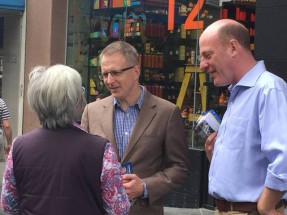
Australia’s 565 local governments copped a serious belting in the last federal Budget (and a serious loss of portfolio relevance in Canberra) under jettisoned PM Tony Abbott, but now successor Malcolm Turnbull and his Minister for Major Projects, Territories and Local Government Paul Fletcher are moving fast to repair some of the major damage.
In a deliberate overture to help heal the yawning rift opened by the previous federal Coalition leadership, Paul Fletcher late last week quietly told the nation’s Mayors they were firmly back on the federal policy agenda. After a cold and lonely stint on the sidelines, winter is over.
“This is the first time for some years that there has been a Minister whose title includes specific reference to local government,” Fletcher pointedly observed in a blog on his website.
“There are at least three important reasons why the Turnbull Government has chosen to underline the importance of local government in this way.”
Like most government lists, the real deal usually sits somewhere towards the end.
Fletcher’s third ‘reason’ says this:
“As Prime Minister Turnbull has made clear, he sees a renewed role for the Commonwealth in working to support and plan for the growth of our cities – which collectively in 2011 contributed $854 billion to our national economy according to the Infrastructure Australia audit issued earlier this year.”
Look at full name of many councils, and you’ll see the name “City of …” in front of many of them; and not just state capitals.
Parramatta City Council has more than 170,000 people living in it, a bit under half of Canberra’s population of 380,000. The City of the Gold Coast has close to 500,000.
Get your local government policy right and there are large numbers of people pleased. Get it wrong and the electoral consequences can be pivotal.
The big problem many populous local governments have these days though is that the highly polarised nature of Australia’s political system can find councils pointlessly punished for accidently falling on the wrong side of the partisan fence –especially when it’s highly localised rather than ideological issues that decide results.
Who fixed a bridge, upgraded broadband or mobile phone reception, fixed a parking problem or got a movie to film in a town. Politicians might want to ‘own’ solutions but they are more often than not based on pragmatism than ideology.
The bone-headed, semi-fanatical opposition of NSW Labor to the renewal of light rail infrastructure in Sydney stands as a case in point.
Sadly, the example sits cheek-by-jowl with the Abbott government’s vindictively punitive treatment of the renewable energy sector.
Stuff the utility, give the other side nothing . . . their gain is our loss so bugger the opportunity cost.
Transport renewal and energy efficiency offer councils a real prospect of improving their communities and saving money at the local level. That opportunity has since been seized with both hands by a far more pragmatic and progressive Baird government that is laser focused on demonstrable results rather than dogma.
Fletcher and Turnbull now have a golden opportunity to positively reset relations between councils and Canberra by backing the kinds of grass roots projects that can make a difference and deliver to local communities in smart and innovative ways that eschew community damaging pettiness — and potentially take state government or three along for the ride.
“When Australians engage with government, nothing annoys them more than buck-passing and finger pointing between different governments,” Fletcher notes.
“Of course it is true that different levels of government have different responsibilities – but all of us have a responsibility to work together to deliver the best possible outcomes for citizens and residents.”
Fletcher’s first major overture to councils obligatorily calls out Roads to Recovery as a cornerstone agenda item, but the real test will be how broadminded the Commonwealth can be when considering projects that offer savings to local communities yet don’t immediately tick stodgy procurement guidelines or fire up the daily news cycle.
There is also a case for overcoming a paralysing fear that credit for good deeds could be claimed by immediate opponents, or worse still Greens and Independents.
Take for example the hysterical campaign run against LED street lighting by some sections of the electricity sector that stood to lose handsome ratepayer revenue in the event councils found a much cheaper way to light up.
Or the Quixotesque war on wind power replete with its own Commissioner.
Energy costs are not everything, but overseas examples that demonstrate savings in emissions and power consumption that come from innovations such as tapping methane from landfill, biomass and water treatment could make a real difference to rates bills, or at least infrastructure maintenance.
In the US there are sewage plants that generate and sell electricity.
Should Canberra be able to become an enabling catalyst for new ideas and innovation, there could be a decent payoff for the initial capital outlay – both financial and political.
As the coal lobby likes to point out, affordable energy fosters economic growth; even if some producers don’t like competition from less capital and carbon intensive methods of production.
“A wide range of critical functions, such as planning, waste disposal and infrastructure provision (including roads and footpaths, parks and sporting grounds, and in many areas sewerage, water and even power) are delivered by local government,” Fletcher observes.
“If it were not for local government, many of the services that Australians take for granted simply would not be there.”
Improving those services without getting hung-up on labels could go a very long way and Paul Fletcher understands the nature of networks better than most, including how to optimise their performance.
Just don’t mention council mergers.





Leave a Reply